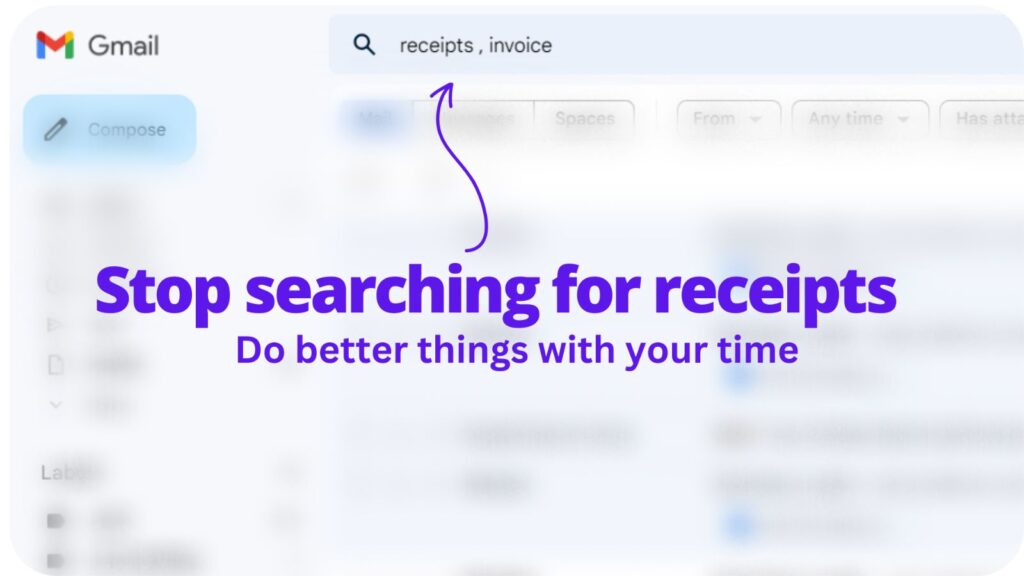Learn how to handle receipts like a pro if you work for yourself.
Being your own boss comes with many responsibilities. Managing your money is one of them. But have you ever wondered why keeping receipts is crucial?
We’ll break down the basics of receipt management for self-employed contractors in a way that’s understandable. You’ll discover why receipts matter and get some helpful tips to make the process a breeze.
Managing your money is one of the crucial responsibilities that come with being your own boss, and an integral part of that is storing receipts as a freelancer. But have you ever wondered why keeping receipts is vital?
Understanding Receipts for Self-Employed Contractors
The Importance of Receipt Management
Firstly, managing receipts is crucial for independent contractors. It’s part of a sound expense tracking process. Receipts stand as proof of your business expenses. This task of self-employed receipt management is not just a best practice – it’s essential for your financial well-being.
Above all, they help lower your self employment tax. How? They reduce your taxable income, which in turn, lowers your self employment tax deduction bill.
For example, if you spend money on car expenses for your business, keep the receipts. At tax time, you can claim these as business deductions. So, good receipt management helps you pay less in taxes.
Common Types of Receipts for Self-Employed Contractors
What types of receipts should self-employed people keep? Here are some examples.
Home office expenses: If you use a part of your home as an office, you have home office expenses. These could be part of your property taxes, utilities, or rent. Keep these receipts for tax deductions.
Travel expenses: When you travel for business purposes, keep the receipts. These might include airfare, hotel costs, or even meals during the business trip. You can deduct these from your business income.
Health Insurance: Self-employed taxpayers can also deduct health insurance premiums. Ensure you keep these receipts too.
Office Supplies: Supplies that help you do your job also count as business expenses. For instance, you might need a new laptop or printer ink. You can claim these as tax deductions.
As a result, you’ll see that various types of expenses can qualify as business deductions. Keep receipts for these and more. And by using the receipt tracker app you can simplify your receipt collection. You will make tax season easier and save money too.
How to Organize Receipts for Self-Employed Contractors
Start with an Effective System
Firstly, you need a good system to manage your receipts. Paper or digital? It’s up to you. A mix of both can work too. This is the first step to track expenses for your business.
For paper receipts, try a simple file folder. Label it by month, or by expense type. It makes finding receipts easier at tax time. And for digital? Use an app or your email. Many allow you to store and sort your receipts in one place.
Stay Consistent with Your System
Next, consistency is key. Try to record expenses as they occur. Don’t let receipts pile up. It can lead to confusion and missing important deductions. Stay on top of your receipt management to save time and money.
If you travel for work, keep track of these expenses. They are tax deductible. Similarly, home office costs can be deducted. Both can lower your taxable income.
Separate Personal and Business Expenses
Another important point is to separate business and personal expenses. Use a business credit card for all business purchases. This helps at tax time. You won’t have to sort through mixed expenses. So, it simplifies your tax return process.
Business meals and travel costs are examples of business expenses. Always use your business card for these. Remember to keep the receipts. They are tax deductible.
Make Use of Digital Tools
Lastly, consider using digital tools. Apps and software can help you stay organized. They let you track expenses, store receipts, and even prepare for tax season. Some even estimate taxes for you. These tools can help reduce your tax bill.
Also, don’t forget about unexpected expenses. They happen in any business. So, always keep receipts for these. They can be tax deductible too.
Digitizing Receipts for Self-Employed Contractors

Use a Scanning App
Firstly, get a scanning app on your phone. Apps like these let you take photos of your receipts. The app then turns the photo into a digital file. You can save this file on your phone or in the cloud. It’s easy and fast. Plus, it means you can ditch the paper. That’s less clutter in your office.
These apps are also handy for car expenses. When you’re on a business trip, simply snap a photo of your gas receipt. The app will store it for you.
Link Your Email
Secondly, link your email to your scanning app. Many business expenses are online these days. Think about it. You buy software online, pay for web hosting, or attend industry conferences. For all these, you get an email receipt. Link your email to your scanning app, and it can save these receipts too.
Doing this helps you keep track of all expenses. So, at tax time, you know how much tax to pay. You have all your business expenses in one place. Plus, they’re easy to find. No more searching through emails.
Use Cloud Storage
Next, consider using cloud storage. It’s a safe place to store your digital receipts. Even if your phone or computer breaks, your receipts are safe. You can access them from any device, anytime. And best of all, many cloud storage options are free or low-cost.
Cloud storage is also great for big files. If you have long credit card statements or big tax form files, cloud storage can handle it. So, all your tax information is in one secure place.
Software Solutions for Managing Receipts for Self-Employed Contractors

Expense Tracking Software
Expense tracking software is a must-have. It’s like a digital home for all your business expenses. You enter your expenses, and the software keeps track of them. It can even sort them into categories for you.
For example, say you have car expenses from a business trip. You simply enter these into the software. It then stores them under ‘Car Expenses’. So, when tax time comes, you know exactly how much you spent on car expenses.
Tax Software
Tax software is another good tool. It can help you work out how much tax to pay. It does this by looking at your income and expenses. Then it calculates your bill. Some tax software can even fill out your tax return for you.
This software is also useful for independent contractors. It can help you work out your self employment tax. This is a special tax that self-employed people have to pay. It covers things like social security and medicare taxes.
Accounting Software
Lastly, consider getting accounting software. It can track expenses, calculate tax, and even send invoices. Plus, it can give you a clear picture of your business income and expenses. So, you know exactly where your money is going.
Legal Implications of Receipts for Self-Employed Contractors

Proof of Business Expenses
Firstly, receipts act as proof of business expenses. They show that you really did spend money on your business. For example, if you have a receipt for a business travel, it proves that you went on a trip for your business.
If you’re audited, these receipts will be very helpful. They can lower your income tax. This is because you can deduct these business expenses from your income. Lower income means lower tax.
Accuracy in Reporting Payments
Next, receipts help you report payments accurately. You have to report your earnings. Your net earnings are the amount you earn minus your business expenses. Your receipts can help you work out this amount.
Why is this important? Well, it affects how much self employment tax you pay. It also affects your social security and medicare taxes. These are taxes that all workers have to pay. They’re a bit like insurance. They help cover costs if you get sick or retire.
Deductible Expenses
Lastly, receipts help you claim deductible expenses. These are costs that you can subtract from your income. Things like home office space, business insurance, and even some startup costs can be deductible.
But, you have to prove these expenses. How do you do that? With receipts. So, keeping your receipts can help you lower your tax bill.
Penalties for Incorrect Reporting
What happens if you report your earnings incorrectly? You could face penalties. You might have to pay extra tax, or even a fine. And if you can’t prove your expenses with receipts, you might be in trouble. So, it’s very important to keep your receipts and report your income and expenses accurately.
Best Practices for Keeping Receipts for Self-Employed Contractors
As an independent contractor, handling receipts is important. It aids in tracking business expenses, a process that could be simplified by using methods such as the “Expense Tracking for Independent Contractors“.
Keep All Receipts
Firstly, keep all your receipts. Yes, all of them. Even if they’re for small amounts. Why? Well, small amounts can add up over time. This can help lower your income tax. After all, these are tax deductible purchases. So, make sure to keep all receipts.
Separate Personal and Business Use
Next, separate receipts for personal and business use. It’s important to keep business expenses separate. This way, you can easily track your business income and expenses. It can also help during tax season. You’ll find it easier to work out your tax deductions. In other words, you’ll save time and effort.
Log Expenses Regularly
Log your expenses regularly. Don’t wait until the end of the tax year. If you do, you might forget some expenses. And, you might lose some receipts. So, make it a habit to log expenses as they happen. You can do this weekly, or even daily.
Consider Professional Help
Lastly, consider getting professional help. This might be a good idea if you have a lot of expenses. A tax advisor can help you understand tax deductions. They can also help you with your tax return. So, it might be worth it to get some help.
Frequently Asked Questions
Why should I bother to keep all my receipts if I work for myself?
If you are an independent contractor, it’s important to track of all your receipts. Every single one is a record of a business cost. These costs can help you lower the income that you’re taxed on. Small costs can add up, making a big difference when tax time comes.
What if I get my personal and work costs mixed up?
If you get your personal and work costs mixed up, it could make doing your taxes harder. It might be tough to figure out which costs were for your business and can be taken off your income. So, it’s best to keep these costs separate. A good way to do this is by using a business credit card just for work costs.
Can I use digital receipts for my taxes?
Yes, you sure can use digital receipts for your taxes. You can keep track of these receipts with apps or emails, and you can keep them safe in the cloud. Just make sure that the digital copies are readable and complete.
How can getting professional help be good for managing my receipts if I’m self-employed?
Getting some professional help can be great for a few reasons. Tax advisors will know all about tax deductions and can help you with your tax return. They can also help make sure your system for managing your receipts is the best it can be. This means you’re less likely to lose receipts or forget costs.
Wrapping It Up
To sum up, if you work for yourself, managing receipts is a very important thing. It’s not just about keeping track of business expenses but also about establishing an effective system that helps simplify this process.
Whether you like paper, digital tools, or a mix of both, keep doing it regularly. Keeping track of costs as they happen and keeping personal and work costs separate can make your life a lot easier when it’s time to do your taxes.
And don’t forget, even small costs are important. They can add up over time and take away from the income you’re taxed on.
Lastly, getting some professional help can be really handy. It could save you money and time. So, keeping and managing your receipts is an important part to be successful when you’re your own boss.

Collect receipts from your email automatically!
Try WellyBox - your AI assistant for receipts😃
Start for Free
